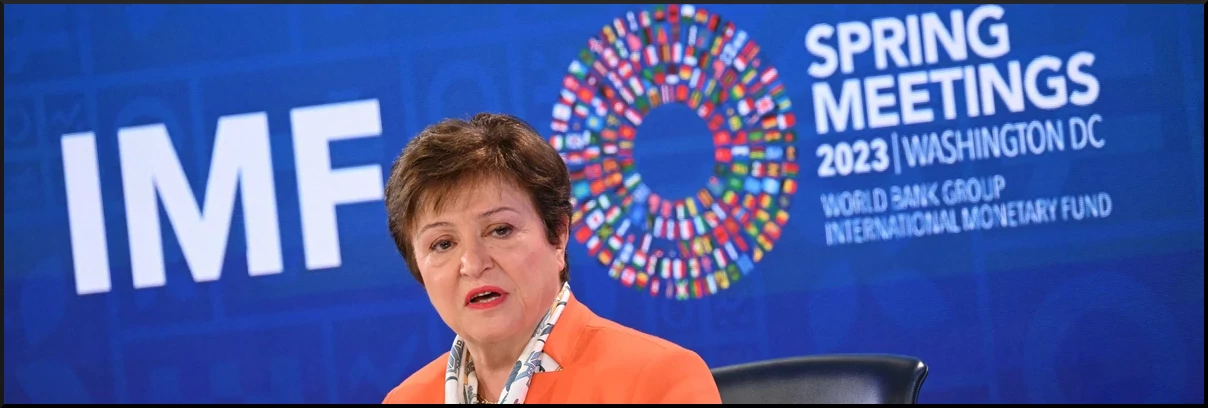by Jake Johnson, published on CommonDreams, April 13, 2023
The International Monetary Fund insists that so-called “social spending floors” enacted as part of its loan programs for poor and middle-income countries help protect critical social services from the kinds of austerity that the powerful institution has historically imposed on borrowers.
But an Oxfam International analysis released Thursday in the midst of the IMF and World Bank’s spring meetings found that the fund’s spending floors—part of a strategy implemented in 2019—”are proving largely powerless against its own austerity policies that instead force countries to cut public funding.”
The humanitarian group estimated that “for every $1 the IMF encouraged a set of poor countries to spend on public goods, it has told them to cut four times more through austerity measures.”
“The IMF’s ‘social spending floors’ encouraged raising inflation-adjusted social spending by about $1 billion over the second year of its loan programs compared to the first year, across the 13 countries that participated where data is available,” Oxfam estimated. “By comparison, the IMF’s austerity drive has required most of those same governments to rip away over $5 billion worth of state spending over the same period.”
@IMFNews has lending conditions for governments designed to promote minimum levels of social spending, to help people cope with economic crisis. But it’s being eaten up by #austerity measures – that are being pushed by the IMF!
Find out more: https://t.co/rkvjwcOpat
— Oxfam International (@Oxfam) April 13, 2023
Oxfam’s report comes as poor countries are facing what the United Nations described Tuesday as a “lost decade” due in large part to soaring debt levels and interest rate hikes implemented by the U.S. Federal Reserve and other central banks.
The U.K.-based advocacy group Debt Justice released figures earlier this week showing that in 2023, lower-income country debt payments will reach their highest level in 25 years, endangering spending on healthcare, education, climate action, and more.
For its new report—titled IMF Social Spending Floors: A Fig Leaf for Austerity?—Oxfam analyzed data from 17 low- and middle-income countries that agreed to long-term loan programs with the IMF in 2020 and 2021, years in which the coronavirus wreaked havoc across the globe.
The group found that the IMF’s social spending floors were ineffective at achieving their stated goal of preserving minimum levels of social investment.
“Based on the available data, not one of the 17 countries currently has a social spending floor large enough to cover the cost of meeting the World Health Organization’s target to reach the Sustainable Development Goal for Health, let alone targets in other areas like education,” Oxfam found. “The floors agreed by the IMF with Chad, Cameroon, Jordan, and Madagascar meant that their social spending targets set in the IMF program had actually decreased by 3-5% over the course of their loans.”
Amitabh Behar, Oxfam International’s incoming interim executive director, said that “to make matters worse, these social floors have become more like ceilings.”
“While only half of the 17 countries we analyzed had actually met their minimum social spending floors—which is disappointing enough—just two had spent 10% more than what they agreed with the IMF,” Behar added.
The new report was published months after a separate Oxfam analysis found that 13 out of the 15 IMF loan programs negotiated during year two of the Covid-19 pandemic required “new austerity measures such as taxes on food and fuel or spending cuts that could put vital public services at risk,” including healthcare.
Half of low- and lower-middle-income countries cut health spending as a share of their budgets during the first two years of the coronavirus crisis, Oxfam and Development Finance International estimated last year.
In its Thursday report, Oxfam suggested a number of improvements the IMF could make to its loan programs to shield poor nations’ key public services from cuts.
“The IMF should set social spending levels to at least meet the spending goals and social outcomes set in countries’ development strategies,” the group recommended. “These should be social spending goals supported by macroeconomic frameworks that enable rapid progress towards the Sustainable Development Goals.”
Oxfam also argued that “social spending floors should be increased through progressive revenue-raising measures, especially different forms of wealth taxation, rather than reallocating resources or budget cuts.”
“While the ‘social spending floors’ initiative retains its original urgency and promise,” Behar said in a statement Thursday, “it is being undermined by the worst effects of austerity that the IMF is pursuing much more enthusiastically.”
Jake Johnson is a staff writer for Common Dreams.
